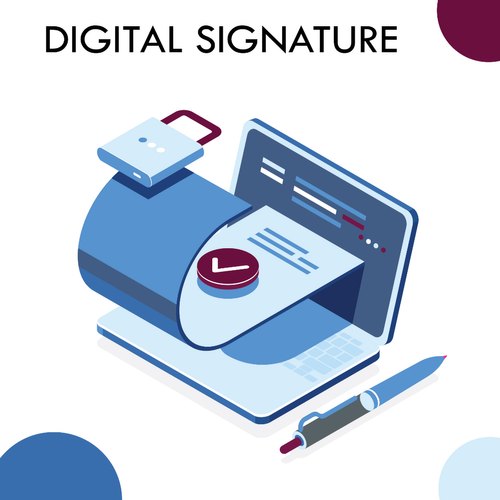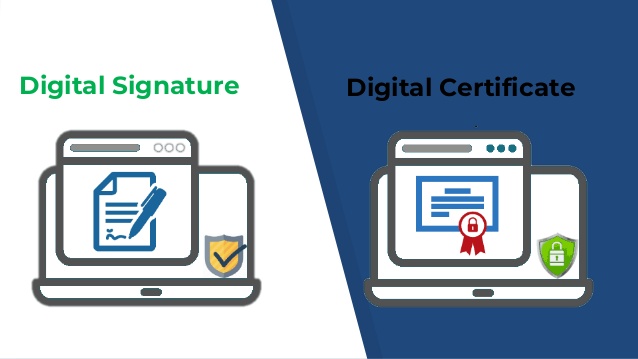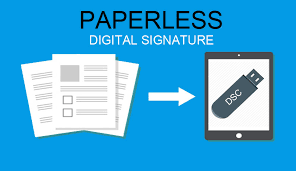A digital signature is a process that ensures that the content of a message is not change in transit. When you, the server, digitally sign a document, you can add a one-way hash (encryption) of the message content using your public and private key pairs. The client can still read it, but “signature” is create through process that can only decrypt the server’s public key. The client can then authenticate the sender as well as the integrity of the message contents, using the server’s public key. Whether it’s an email, an online order, or a watermark photograph on eBay, if the transmission arrives but the Digital signature in Coimbatore does not match the public key in the digital certificate, the client knows the message has changed.

Creating the digital signature
You can get a digital signature from a reputable certification authority like Sectigo, or you can create one yourself. You need a digital certificate to sign a document digitally. However, if you create and use a self-signed certificate, the recipients of your documents will not be able to verify the authenticity of your Digital signature in Coimbatore. They must manually trust your self-signed certificate.
If you want recipients of your documents to be able to verify the authenticity of your digital signature certificate you must obtain a digital certificate from a reputable CA. After downloading and installing the certificate – you’ll be able to use the ‘Sign’ and ‘Encrypt’ buttons on your mail client to encrypt your emails and digitally sign your emails. This gives more insight into the business scenario, as it assures the recipient that it was actually sent by you or not.
The digital signature is apply and verify, as follows:
- Document or message sender (signer) or public / private key supplier shares public key with end user (s).
- The sender attaches an encrypted signature to the message or document, using its private key.
- The end user decrypts the document and verifies the signature, telling the end user that the document belongs to the original sender.

Features of DSC
Data integrity
Message or data integrity is especially crucial during data transfer. Data integrity ensures that the message receive by the recipient is the same message sent by the sender. In large field networks such as the Internet, where messages have to move from one node or network device to another before reaching its final destination, there is always the risk of messages being change intentionally or accidentally. Data integrity methods help to reduce those risks. By checking the data integrity, you will know if the message you received has been tampered with.
Authentication
When you receive a sensitive file, it is not enough to know that the information in that file has been tarnished. You also want to make sure that it actually came from the person you think sent it to. In other words, you will need a mechanism that will enable you to authenticate the source.
For example, let’s say you’ve got a list of your top managers with a request for your corresponding salary. It would be wise to first certify the source of the request before sending the appropriate response. You do not send that information to unauthorized employees or any competitors.

Non-reputation
Finally, there may be data exchanges where you don’t want senders to reject transmissions that have sent them some time in the past. For example, if a report is submit and the report later appears to be fraudulent, you do not want the sender to deny the fact. So how will digital signatures help you achieve these information security goals? Maybe it would be best to start by explaining how they work.
Where they are use?
Due to the many benefits it brings and the level of security it offers, digital signatures have been adopt by numerous organizations in the public and private sectors and in a variety of industries such as finance, healthcare or legal. The laws of each country govern its use. In addition, many companies want to achieve a model of “paperless office fees”, which allows them to save costs, have a better organization of documents and minimize environmental impact.
Working
Digital signature certificate in Coimbatore are use for the execution of electronic signatures, a broad term that refers to any electronic data that is intend for signing, but not all electronic signatures use digital signatures.
Digital signatures use asymmetrical cryptography. Asymmetric cryptography, also known as public key cryptography (PKI), uses public and private keys to encrypt and decrypt data. Only a large number of keys are pair but not identical (asymmetrical).
A pair of keys can be share with everyone; this is call the public key. The pair’s second key is kept secret; this is call a private key. The key can be use to encrypt any message; the opposite key is use for decryption, the one used to encrypt a message.
In many cases they provide a level of validity. And also the security to messages sent through a non-secure channel. Digital signatures are in many respects the equivalent of traditional handwritten signatures, but properly implement digital signatures are more difficult to create than the handwritten type.

Some applications
Digital signatures are use in software programs, such as browsers, that require a secure connection to an insecure network, such as the Internet. Users and systems need to make sure that the public key is authentic, that it belongs to the claimed person or entity and that it has not been tampered with or replaced by a malicious third party.
The United States Government Printing Office Fees (GPO) publishes an electronic version of the budget, congressional bills with public and private laws, and digital signatures.
Digital signature in Coimbatore can reduce the time it takes to close an agreement that requires many parties to recognize and sign them. E.g. A mortgage agreement requires a number of parties to ratify the agreement and sign it at various stages of the mortgage life cycle. Content Parties – Buyers, Lenders, Sellers, Attorneys, Real Estate Agents, Title Agents, Finishing Agents
With the stable nature of the blockchain, the validity of the agreement can be trust at any time, so that all these parties can sign the agreement at their convenience (no need to be present at the same time).

